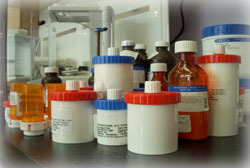What exactly is compounding?
It is the practice of mixing raw ingredients to prepare medications. Compounding can only be done by a licensed pharmacist.
Isn’t compounding something that all pharmacists did in the past?
Yes! It used to be routine for pharmacists to compound all medications. However, in the 1950’s, when pharmaceutical companies began mass producing drugs, pharmacists no longer needed to compound most medications and compounding became less utilized.
Why do we need compounding pharmacies now?
We are currently experiencing a need again for compounding pharmacies and pharmacists. There are many patients who have unique medication needs that are not being met by pharmaceutical companies. Compounding pharmacists can customize medications for those patients. They have the flexibility and options that pharmaceutical companies do not.
How do compounding pharmacies help patients?
Some patients may have allergies to certain ingredients found in mass-produced drugs. Or, for medical reasons some patients may have difficulty swallowing a pill and may need a liquid or topical cream version of that medication. Children and pets might need flavored medicines, or medicines that are a different dosage or concentration than what is available from pharmaceutical companies. Compounding pharmacists have the ability to change, or “customize” medications to meet a variety of patient needs.
What other unique or unusual patient needs require the help of compounding pharmacists?
- Some patients might require very limited dosage strength, such as infants.
- Patients who are diabetic, require medications that are sugar free. Many manufactured drugs do not come sugar-free.
- Certain drugs are simply not in demand by many people, so pharmaceutical manufacturers discontinue producing them because they are unprofitable. These are called “Orphan” drugs. Compounding pharmacists can still make these drugs however, because they have all ingredients!
- Many young children prefer flavorings added to liquid drugs because it makes the medication taste better. Parents and caregivers especially like the variety of flavorings compounding pharmacist can add because now their child will easily take their medication!
- Veterinary medicine- Animals might need a different dose than what is commercially available, they might need a more easily-administered form (such as a liquid, a transdermal gel, or a chewable treat), or they might prefer a flavoring added. All these customizations make the medicine more palatable to the animal. This not only contributes to the animals’ well-being, but also makes it easier for the pet owner to give their animal the medicine they need!
- Some patients (both women and men) might need a different type of hormone replacement therapy, such as bio-identical hormone replacement therapy.


